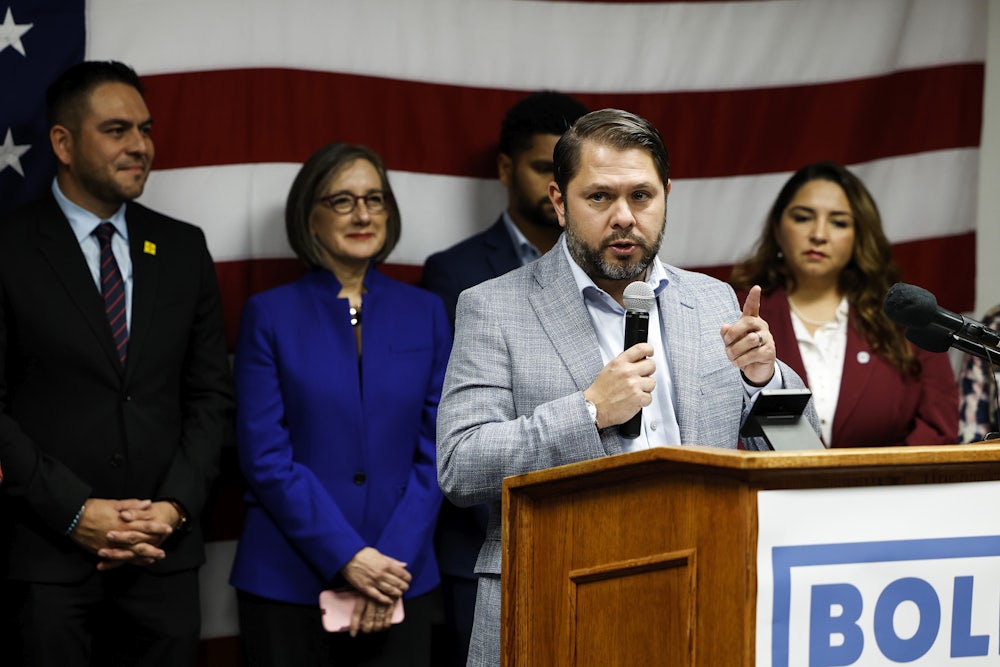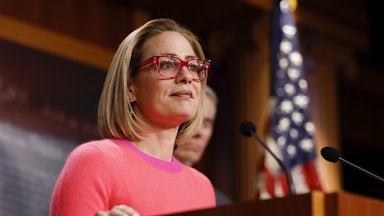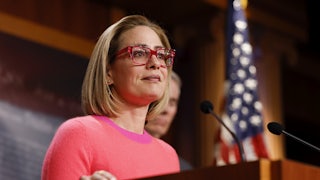With Senator Kyrsten Sinema announcing her departure from the Democratic Party in a shocking but rather unsurprising move, her progressive critics may seize the opportunity to launch campaigns against her. Sinema has been instrumental in crafting some of the biggest bipartisan victories of the past two years while also aggravating her own party for occasionally stymieing President Joe Biden’s agenda.
The announcement sent Washington—and Twitter—into a tizzy on an otherwise sleepy Friday. Democrats were quick to denounce Sinema’s decision. “Senator Sinema may now be registered as an Independent, but she has shown she answers to corporations and billionaires, not Arizonans. Senator Sinema’s party registration means nothing if she continues to not listen to her constituents,” the Arizona Democratic Party said in a statement.
Sinema has rankled Democrats for her opposition to raising taxes on corporations, and was censured by her own state party for refusing to support eliminating the filibuster to pass voting rights legislation. Sinema, who received $1 million in donations from Wall Street in the past year, ensured that a tax increase on hedge fund managers and private equity executives was not included in the final Inflation Reduction Act. She has also raised significant donations from the pharmaceutical industry.
Sinema’s decision drew swift condemnation from Representative Ruben Gallego, a frequent critic of the senator who has rather transparently teased the idea of running against her for the Senate seat. But while Gallego very strongly hinted that he would be a good statewide candidate, in a statement released on Friday, he stopped short of announcing his own bid for Senate. “Whether in the Marine Corps or in Congress, I have never backed down from fighting for Arizonans. And at a time when our nation needs leadership most, Arizona deserves a voice that won’t back down in the face of struggle,” Gallego said. “Unfortunately, Senator Sinema is once again putting her own interests ahead of getting things done for Arizonans.”
Gallego has allowed the prospect of a primary challenge to float around the political sphere for months. In recent days, he has been interviewing political vendors, according to a Democratic strategist with knowledge of those talks. Those discussions are a likely sign that he is charging ahead with a Senate campaign.
Sinema has not said whether she would run for reelection—she is currently serving out her first term—but many surmise that she made this announcement to avoid a primary that she would likely lose. A September AARP poll showed that Sinema is viewed unfavorably by 54 percent of all likely voters, as well as by 57 percent of Democrats, 51 percent of independents, and 54 percent of Republicans. Private polling has showed Sinema in direr shape among likely Democratic voters, according to a Democratic strategist with knowledge of those surveys.
“This is another cynical move to prolong her career. It’s not going to work,” said Leah Greenberg, the co-executive director of the progressive group Indivisible, in a scathing statement. Greenberg highlighted how Indivisible had campaigned for Sinema in 2018, arguing that support from their volunteers helped to turn red counties blue. “It turned out Sinema’s constituents were never really Arizona voters. Sinema’s constituents are Big Pharma and private equity. That’s why our goal is not to beat her. She was already going to lose. Our goal will be to make sure she becomes a political cautionary tale.”
Politico reported that Authentic, a top progressive digital firm, had dropped Sinema as a client on Friday. Sacha Haworth, Sinema’s communications director in 2018, had strong words for the senator as well, calling the decision “a slap in the face to everyone who broke their backs to get her elected in 2018.” “Sinema is showing us who she’s been all along: out for herself,” Haworth wrote on Twitter. (Politico also reported Haworth is joining the Primary Sinema campaign, which is not affiliated with any particular candidate.)
Paco Fabian, the director of campaigns for the Bernie Sanders–aligned Our Revolution, said in a separate interview that Sinema probably “knows that she’s going to have a serious challenge in 2024.” Fabian also predicted that Sinema’s decision was an early indication that she planned to run for reelection. Our Revolution, Fabian added, would likely weigh in on the 2024 Arizona Senate race and would back someone other than Sinema.
“Once we figure out what the field looks like, we should be making an endorsement about this,” Fabian said.
In an opinion piece published in The Arizona Republic on Friday morning, Sinema lamented party polarization, arguing that Arizonans repudiate the “false choice” presented by a two-party system. Arizona has a stubborn maverick streak, and the state’s voters are divided into roughly even thirds of Republicans, Democrats, and independents.
“When politicians are more focused on denying the opposition party a victory than they are on improving Americans’ lives, the people who lose are everyday Americans,” Sinema argued in the op-ed. “That’s why I have joined the growing numbers of Arizonans who reject party politics by declaring my independence from the broken partisan system in Washington.” (Sinema, who is typically press-avoidant, also granted interviews to Politico and CNN explaining her decision.)
Sinema’s announcement also rubbed some of the luster off national Democrats’ otherwise triumphant week, after Senator Raphael Warnock won his runoff election on Tuesday. But she told Politico that she will not caucus with the Republican conference in the Senate. She will also not attend Democratic caucus meetings, although she rarely participates in those weekly gatherings now. But she insisted that she will vote the same way that she has before; she is more progressive on social issues and has generally supported Biden’s nominees. Majority Leader Chuck Schumer—who noted in a statement that “Kyrsten is independent; that’s how she’s always been”—said in a statement that Sinema would keep her committee assignments. White House press secretary Kimberly Jean-Pierre called Sinema “a key partner” and said, “We have every reason to expect that we will continue to work successfully with her.”
Sinema has been in the negotiating room for several bipartisan bills that passed this Congress, including an infrastructure law, gun safety legislation, and a measure recognizing same-sex marriage under federal law. John LaBombard, a Democratic strategist who previously served as Sinema’s communications director, told The New Republic that her decision was just a “natural extension” of her previous actions in the Senate, and contended that it had nothing to do with her reelection prospects.
“This gives her a stronger platform from which to achieve these results, so she’s completely free from the partisan process,” LaBombard argued. “I’m not sure that there’s all that much reason, even for critics of her approach or centrism, to be too upset about this, because I think it just reset all expectations, and I think it might strike a lot of people as something that just makes sense.”










